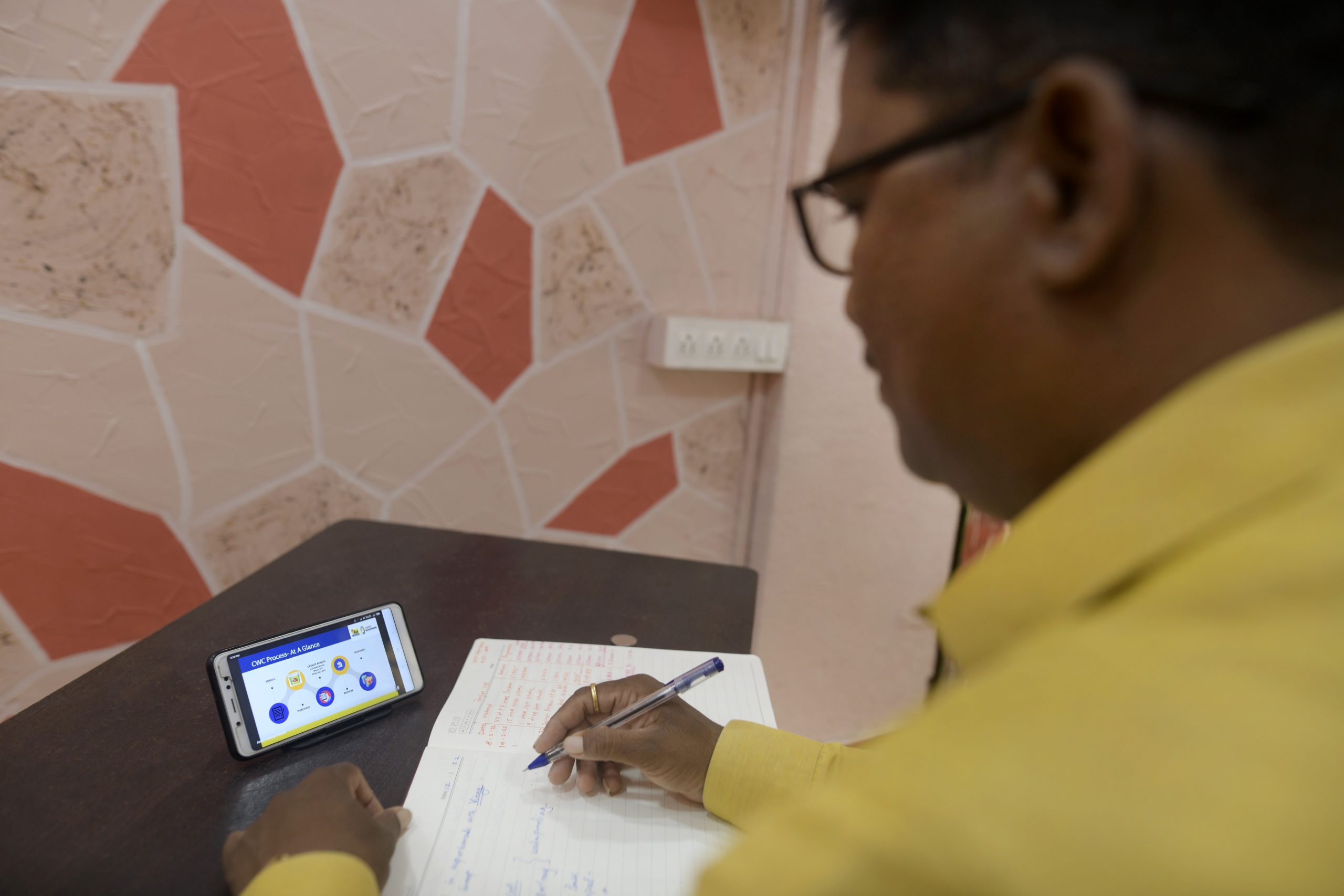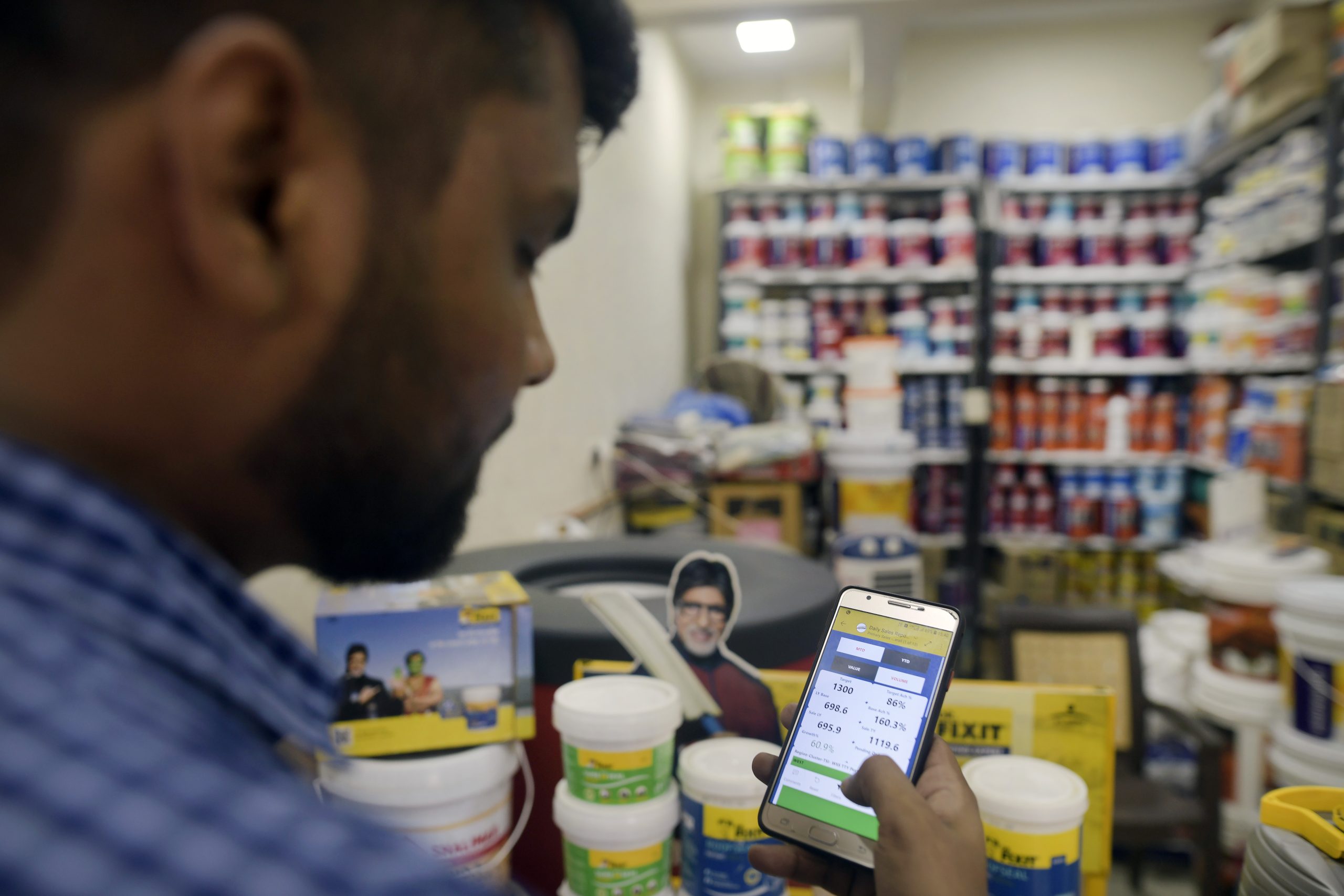
How Pidilite is using technology to build stronger bonds with its customers
Shankar Thule offers painting, waterproofing, and plumbing services as a civil contractor on construction sites in India’s western state of Maharashtra.
He picked up most of his skills on the job – initially by working with experienced professionals, and as he gained experience, by attending industry seminars and workshops and gaining certifications.
When the pandemic brought construction activities to a grinding halt with a strict lockdown that lasted a few months, his work came to a standstill, but his learning didn’t.
Locked inside his home, Thule turned to his smartphone and signed up for a digital certification course offered by Pidilite, India’s leading company in specialty chemicals such as adhesives, construction chemicals, and sealants.
He earned the highest-level certification of a Champion Applicator for Dr. Fixit, Pidilite’s waterproofing products and services brand. The certification validates the effort he put into upskilling himself and it also earns him business leads from Pidilite.

Thule is among more than 14,000 masons, carpenters, plumbers, and civil contractors across the country, who have leveraged certification courses designed by Pidilite and delivered online via Microsoft Community Training (MCT) platform.
MCT is an Azure-powered, Massive Open Online Course (MOOC) platform for online learning. It enables anyone to connect to educational courses on any device connected to the internet.
When the pandemic struck, one of the biggest challenges for Pidilite was how it could stay in touch with its user base and offer them help when construction sites and ancillary businesses had come to a grinding halt.
“Our sales happen when a carpenter, civil contractor, or plumber chooses to pick up one of our products from a construction supplies or hardware store,” explains Mayur Danait, the chief information officer at Pidilite Industries Ltd.
“If they don’t know how to use a product properly, it affects the quality of their work which has a direct bearing on our brand reputation. So, it is crucial for us to closely work with these customers to and educate them on the right product usage and application techniques.”
The pandemic necessitated Pidilite to move their training sessions, which were earlier conducted face to face to an online platform.
“We were looking for a large-scale training and learning solution for the contractor and dealer community. Most of the platforms we came across are platform-centric and not community-centric,” says Nishchai Nitin Nevrekar, head of digital initiatives, Pidilite.
After thorough market research, Pidilite came across MCT and created a course on COVID-safety protocols to be followed by their end users. The positive response that the initial couple of courses received encouraged Pidilite to add more. Today, there are over 25 courses on for various customers–from painters to contractors, and even dealers.
Naresh D. Macha, who is the training manager for Pidilite’s “small town India” division, created most of these courses and says MCT solved problems of access and low bandwidth. The platform also enables learners to watch the courses at their convenience and they can revisit any course, if required.
The pandemic-induced lockdown of 2020 led Pidilite to reimagine processes for employees as well. For Pidilite, like thousands of organizations across the globe that embraced remote work at the beginning of the pandemic, the first port of call was Microsoft Teams.
“We had seen the inherent potential in Teams to enable collaboration, so we had been encouraging its usage (within Pidilite),” Danait recalls. “Of course, the numbers were low earlier, but they went through the roof after the lockdown was imposed.”
While the employees took to Microsoft Teams quite seamlessly, for Danait, the real exciting use of Teams was happening somewhere else.
As all field marketing initiatives also came to an abrupt halt, the company decided to try moving its external meetings with their dealers and distributors to Teams as well.
“We did hundreds of meetings with our dealers and distributors via Teams at a time when we couldn’t meet them in person,” Danait says. “We were encouraged by how this group of users, whom we didn’t associate with being tech savvy earlier, became quick adopters of something as sophisticated as Teams.”
It’s safe to say that digital adoption has provided some very clear wins for Pidilite. But now that the world is inching towards normalcy, how does Pidilite plan to carry on the strong digital momentum it has gathered?
“While we don’t plan to give up on the gains of the high levels of digital adoption, we also recognize the value of in-person meetings.” he says. “The way forward is being able to come to a calibrated equilibrium of assessing areas where digital or physical approaches would deliver more effective outcome and then take the relevant decision in that context.”
The pandemic only acted as a catalyst to accelerate the pace of technology adoption at Pidilite as it had been on a path to digitally transform its business much before.
“Back in 2018, we had implemented Microsoft’s framework for digital transformation to engage customers, empower employees, optimize operations, and transform products,” says Danait.
Earlier, Pidilite used multiple management information system tools, but they realized those just generated data but offered no insights.
“We wanted to create a common platform for all business divisions and use data-based analytics with a single source of truth for making business decisions,” recalls Rahul Verma, the chief of digital initiatives and business applications at Pidilite.
Verma’s vision was to democratize access to data and have employees create their own dashboards and, in a way, empower them to become data scientists for their own businesses.
So, his team created an Azure Data Lake to house every byte of data generated across the organization. This information now feeds into dozens of PowerBI dashboards that are created and used by various teams.

One of the biggest users of these PowerBI dashboards is Chandan Kumar Dass, who heads sales for the ‘Emerging India’ division.
He oversees a team of 1,000 sales representatives, who work with regional distributors in rural and semi-urban India.
“Since our sales representatives tend to travel a lot, we needed a solution that would empower them to access their KPIs on their phones on the go. The beauty of PowerBI is that we have created a live dashboard for every business issue, customized for each sales representative,” he says.
With Power BI dashboard, sales representatives can now zoom in on the performance of every dealer in their area and engage in fact-based conversations with them.
“These wow the dealers too because it reassures them that the company is invested enough in their business to track their data in such detail,” Dass adds.
Today, the company has “champions” across various divisions that are creating PowerBI dashboards to enable their teams to make more informed business decisions.
For more than six decades, Pidilite has been promising unbreakable bonds to its customers. And this is not just engrained in the products it makes but the culture its employees live every single day to serve their partners, dealers, and users, with a little help of technology.
Abhishek Mande Bhot is an independent writer and editor covering news, lifestyle, and luxury for publications in India and the US.

